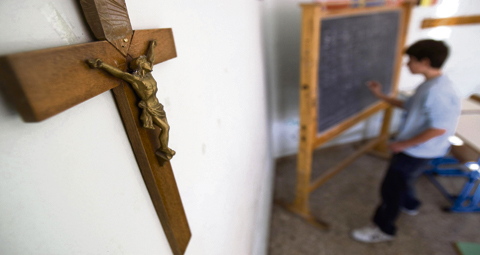
Are we protecting Catholic education?
We must reverse the damage of shared campuses, public opinion and critics to save our schools
By Kevin McKenna
MY friend was once the education correspondent for a national newspaper in Scotland when he visited his first Catholic secondary school, St Andrew’s in Glasgow’s Carntyne district. The school serves one of the most socially disadvantaged communities in Europe and had been receiving glowing praise in a report by Her Majesty’s Inspectorate of Education (HMIE) and my colleague simply wanted to see what all the fuss was about. To say that he, an atheist who had previously been opposed to separate Catholic schools, was impressed would not do justice to his thoughts when he came to share them with me. More than 15 years later I can still recall them vividly. “As soon as I walked in the front door to be greeted politely by uniformed pupils I knew that something special was afoot here,” he said. “I didn’t know what a Christian ethos was before this visit, but I know now. What I experienced there made me feel a lot better about Scottish education.”
Before his school visit, this man, like many other Scots who are not Catholic, simply couldn’t understand why separating children at the age of five and sending them to different schools according to their faith should be tolerated in a multi-cultural society. His previous position on Catholic schools was a sincere one and did not stem from anti-Catholicism. It was simply one of many views on how education is shaped in Scotland.
In 2013 there are still many of our fellow Scots who want to remove Catholic schools. This is simply a valid, if mistaken, view being expressed openly in a modern democracy. It would be an error to view this as evidence of deep-rooted anti-Catholicism. There will always be people though, who will oppose our Catholic schools for darker reasons; they simply have a hatred of Catholicism and Irishness and are implacable in their desire to damage the Church in any way they can. In 2013, many of those who hold such views will be found among secularists and those who have made Richard Dawkins their patron saint. (Although when I hear Mr Dawkins’ latest deranged outpouring of bile against the Catholic Church I wonder if he is not the single greatest advertising vehicle we have, and whether he’s been taking his pills recently). It is important though, to distinguish between those who oppose faith schools on honest grounds and those who simply want to attack any manifestations of Christianity.
The Catholic Church in Scotland has made many concessions already in the debate about faith schools. For more than ten years now they have participated in the shared campus project in west central Scotland and often it has been to our detriment. There appears to be a general assumption in society that these crude approximations of tolerance and anti- sectarianism must become the norm for school campuses and that no new schools specifically for Catholic children will ever be built and funded by the state in Scotland again. “You’ve admitted defeat simply by agreeing to shared campuses, so why don’t we just go the whole way?” the anti-Catholic brigade is asking.
Unfortunately, I believe that some of our Catholic leaders have been too quick to agree to so many shared campuses and have simply not been sufficiently clever or tactically astute in maintaining solidly Catholic education establishments. Many children will view as absurd their attendance at a school that has a physical dividing line built-in to its infrastructure. Certainly a lot more absurd than simply going to a different school altogether. What is absurd, of course, is the notion that Catholic schools are chiefly responsible for anti-Catholicism in the first place.
Yet it seems to me that some of the most vocal and articulate supporters of Catholic schools are to be found not in our own church but in the secular political parties. The two finest and most powerful political leaders Scotland has had since devolution, Alex Salmond and Jack McConnell, have repeatedly given ringing endorsements about the place of Catholic schools in Scottish society and in language that has been much more effective than anything we have been able to muster.
It has been this inability to articulate properly why Catholic schools are good for Scotland that has led to their erosion in the Trojan Horses of shared campuses. Instead, we have become obsessed about others secular issues such as marriage reform when the bigger threat to the Faith has been the losing battle on Catholic schools.
As such, there have to be severe doubts that what we know as Catholic education will still exist at the end of this generation. If this happens then don’t blame the Orange Order or the secular humanist society, instead look to our own abject failure to make a philosophical case based on human rights while we were fashing ourselves about matters not nearly as important.
If we want to guarantee that future generations of Scottish Catholics can have access to a state or at least an affordable Catholic education then our leaders must begin to think strategically and, as they say, outside the box.
Perhaps we should hold exploratory talks with our fellow Christians in the Reformed denominations about the possibility of establishing a coalition of Christian campuses and a working party should be dispatched, simultaneously, to visit similar projects in England and Wales. A funding model should be devised that may include contributions from local authorities, the churches themselves and sympathetic entrepreneurs. It would be desirable to include the teaching unions, but not absolutely essential.
If this approach were to succeed then we would guarantee a Catholic education for our children for generations amidst a broad-based Christian coalition. And we would silence overnight those who say that ‘faith’ schools cause sectarianism.
If we do not adopt a radical approach soon for the future of Catholic schools, then I fear that all vestiges of Christianity will disappear from education in our lifetime.
— Kevin McKenna is former deputy editor of the Herald and former executive editor of the Daily Mail in Scotland. He is currently a columnist for the Guardian











While I agree with most of what Mr McKenna has said, I am concerned that his reference to the re-definition of marriage as one amongst “other secular issues”
may be missing the point. If the re-definition of marriage goes ahead as planned, this could be the final nail in the coffin for Catholic schools since people like myself will no longer be able to express the teachings of the church on marriage without being outside the law, irrespective of any guarantees of protection given within the legislation. No-one can tell where this change in the law will take us but it won’t be good for freedom of speech and could spell the end of Catholic schools forever.